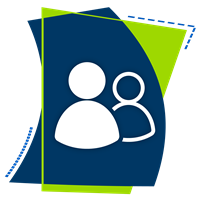Peer Mentoring
The Network’s Peer Mentoring Program offers a structured environment for people with kidney disease to develop one-on-one relationships while providing experiential support from peer mentors to peer mentees. In addition, it advocates for patient education through the Kidney Learning Hub, the program’s learning management system, and encourages patient peers to engage one another to remain active by sharing the lived experiences of their ESRD journey. The strategies and tactics referenced in this toolkit offer a starting point for dialysis providers to develop and implement this program in their center.
Hub, the program’s learning management system, and encourages patient peers to engage one another to remain active by sharing the lived experiences of their ESRD journey. The strategies and tactics referenced in this toolkit offer a starting point for dialysis providers to develop and implement this program in their center.
Benefits of the Peer Mentoring Program
-
Enhanced communication and understanding between staff and patients.
-
Meet the Centers for Medicare & Medicaid Services (CMS) Quality Incentive Program (QIP) requirements.
-
Improve patients’ knowledge and empower patient self-efficacy.
-
Increase patients’ socialization with one another and their facility patient representatives.
-
Improve facility and patients’ outcomes.
-
Improve home dialysis and transplant referrals and/or patient interest.
-
Improve new patients’ adjustment to the facility and demands of treatment.
Step 1 - Program Video
Members of the interdisciplinary team must watch the “Network & Facility Peer Mentoring Program” kick off video and attest to it.
Step 2 - Referral Form or Application
Use the following application to nominate/recruit mentors or mentees. Submit all completed forms via fax to Yessi Cubillo at (609) 490-0835.
Step 3 - Kidney Learning Hub
Mentors and mentees should register on the Kidney Learning Hub at www.kidneylearninghub.com.
Step 4 - Peer Mentoring Education Program
Mentors should access the Peer Mentoring Education Program and take the required courses.
Upon finishing the courses and orientation, peer mentors will be given a Certificate of Completion. The certificate acknowledges that the peer has completed the necessary activities to become a facility peer mentor.
Step 5 – Pairing Peers
For in-person pairings, consider the timing of mentor and mentee treatments and transportation and try to coordinate so that peers can meet before or after their treatment. Using the peer Referral Form and in collaboration with the dialysis facility, patient peers should have similar communication styles. Situations can arise where the dialysis facility or Network Peer Mentoring Champion may need to intervene to support the peers. Always be mindful that sometimes pairings just don’t work out, and no one is to blame should this happen. Encourage the mentor and mentee to try meeting again or consider being paired with another patient peer.
This is a confidentiality waiver, which must be signed by both the mentor and mentee.
The resources below can be found on the Kidney Learning Hub and are designed to support peers in their mentoring relationship.
-
Share the "A Patient Peer Mentoring Program" video with patients while on treatment, lobby TV, etc.
Step 6 - Monitoring and Tracking Peer Mentoring Activities
Peer mentor log form:-
Measure activities of mentoring.
-
Do not share information about discussions between mentors and mentees.
-
Will be used to collect/assess weekly mentoring outcomes or lack thereof.
-
Log can be emailed or faxed to assigned Network staff.
This is for the mentor to complete and provide to the staff or directly to the Network.
Supportive Resources
Additional Kidney Patient Support Opportunities
-
Renal Support Network (RSN) HOPEline (A Peer Support Hotline - "Support from Someone Who's Been There)
-
(800) 579-1970 (Toll-Free from 10:00 a.m. to 6:00 p.m. PT)
-
-
GetSetUp (English Flyer / Spanish Flyer)
-
In an effort to combat social isolation, the NJ Human Services Department has partnered with GetSetUp, an interactive online learning community, to provide free, live virtual classes for New Jersians ages 60 and older. The GetSetUp platform offers live classes taught by peers who are experts in their field, social hours hosted by community members, and special events with speakers who directly address areas of interest to older adults. You may choose from more than 500 available classes on a range of topics such as aging in place, computers, budgeting, mental fitness, and more. Classes are offered 24 hours a day in English, Spanish, Hindi and Mandarin.
-

